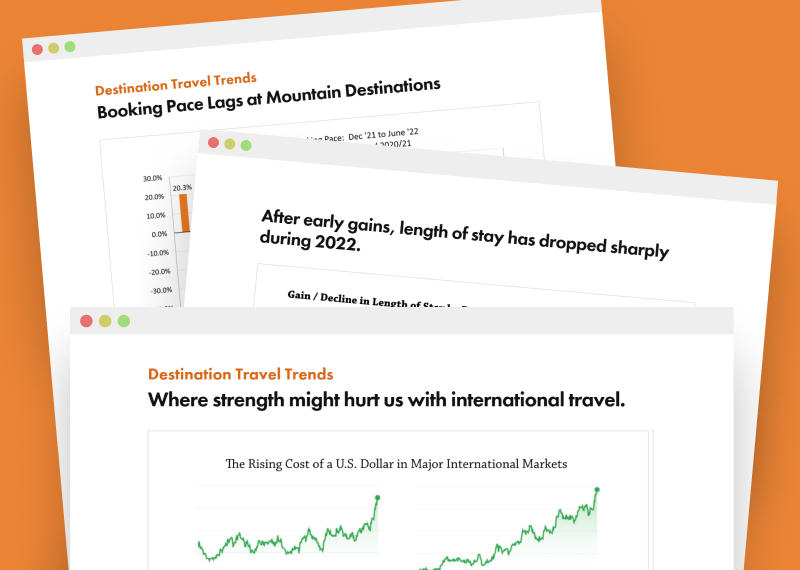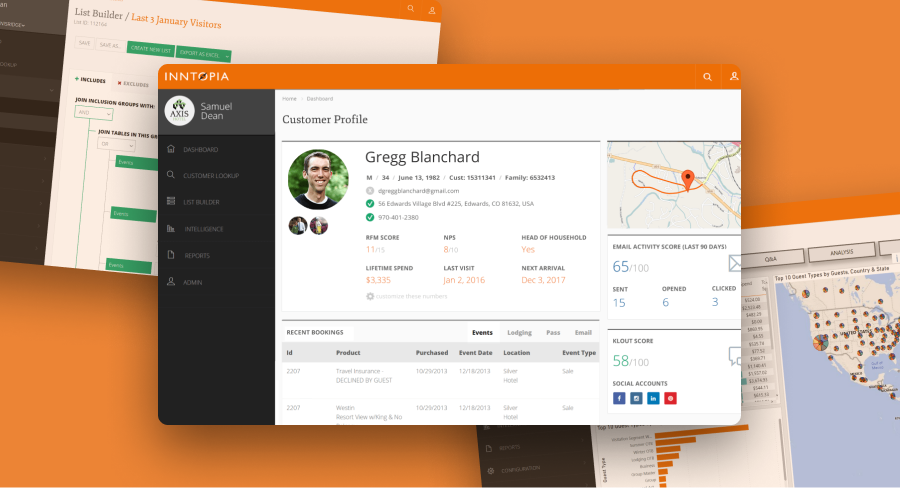
If you have a hotel and you have guests, chances are you either already have or are looking for a hotel customer relationship management (CRM) tool. This technology appears simple in theory but can be tricky in practice when it comes to connecting all the dots between your hotel’s guests, their data, the places you interact with these guests, and the things your team can do to help each guest have an incredible experience.
In this guide we’ll answer three simple question:
- What exactly is a hotel CRM?
- How does a hotel CRM work?
- Why do you need a hotel CRM?
- What are the attributes of the best hotel CRMs?
Even more, we’ll explain the attributes and factors that are unique to the hospitality industry that your team needs to consider when shopping for a hotel CRM like Inntopia Marketing Cloud. Let’s jump in.
What is a hotel CRM?
To understand what a hotel CRM is, we first need to start at the basics. A hotel CRM is a tool that connects two parts of your business. The first part is what you know about your guests. This is all the data you have in your property management system (PMS), maybe a POS, marketing systems, surveys, and other places your team interacts with guests. The second part is that last part, those interactions. Because every time your hotel’s team sends an email, meets them in person, chats in the call center, or reaches them with an ad or offer, each interaction will be many times more effective if it’s based on what you know about your guest.
In other words, a CRM allows you to use everything you know about your guest to enhance every interaction your guest has with your brand.

A good hotel CRM will aggregate, cleanse, and make guest data accessible to your teams.
Example
Let’s say that Julie Jones spends a weekend at your hotel every few months with her husband and two children. They love the two bedroom suite and every morning they have breakfast together in the cafe. Now, Julie came just a few weeks ago but you’re got a soft spot in your occupancy you’re trying to fill. If you send an email to Julie about an upcoming offer, is Julie more likely to act on that offer if it’s for:
- A midweek stay in a single king room inside an email template that includes a photo of a businesswoman working on her laptop?
- Or if it’s a weekend stay for a two bedroom suite and a photo of a family at the top?
We all know intuitively – and the data support this intuition – that Julie is much more likely to act on a message that speaks to her in language, imagery, and offers that are aligned to her exact situation, needs, and interests. That’s what the functionality of a CRM does. It creates powerful opportunities for customer engagement by taking everything you know about a guest across all of your systems, cleans and structures that data, organizes it into insightful guest profiles, integrates those guest profiles into every potential touchpoint across marketing, call center, guest service, etc., and then helps automate guest service and revenue generation based on the opportunities and behaviors it identifies.
That last point is really important. If Julie calls your call center and they’re helping her make a reservation, you’d want that agent to see exactly what she’s done in the past to help her plan her next stay. An agent without insight into a guest’s interests, needs, and behavior is flying blind. A good hotel CRM gives them all the information they need to serve that guest.
How does a hotel CRM work?
As we mentioned earlier, a CRM system in an all-in-one tool that has five primary tasks:
- Aggregate your hotel’s guest data
- Clean your hotel’s guest data
- Organize that data into guest profiles
- Integrate those profiles into guest touchpoints
- Automate guest service based on that data
Each of these individual parts of a hotel CRM are important. Each is also often misunderstood or overlooked when shopping for a new customer relationship platform. So instead of answer this question as a whole, let’s talk through each each element of a hotel CRM individually.
#1) A hotel CRM aggregates your hotel’s guest data.
The first step is aggregating all of the data you have about your guests. This is both a one time action to load historical data but also ongoing as new data is generated through things like transactions. A hospitality CRM will create a connection to your PMS, POS, survey, marketing, and other systems to pull guest data out of those sources and into your central, hotel CRM database. This may be done in real-time, nightly, weekly, or on other frequencies depending on your needs and the constraints of those systems. Some legacy PMS platforms, for example, weren’t built to share data with other systems and trying to grab data too frequently can strain the database and interrupt your team’s access. In this case, a nightly load might be appropriate.
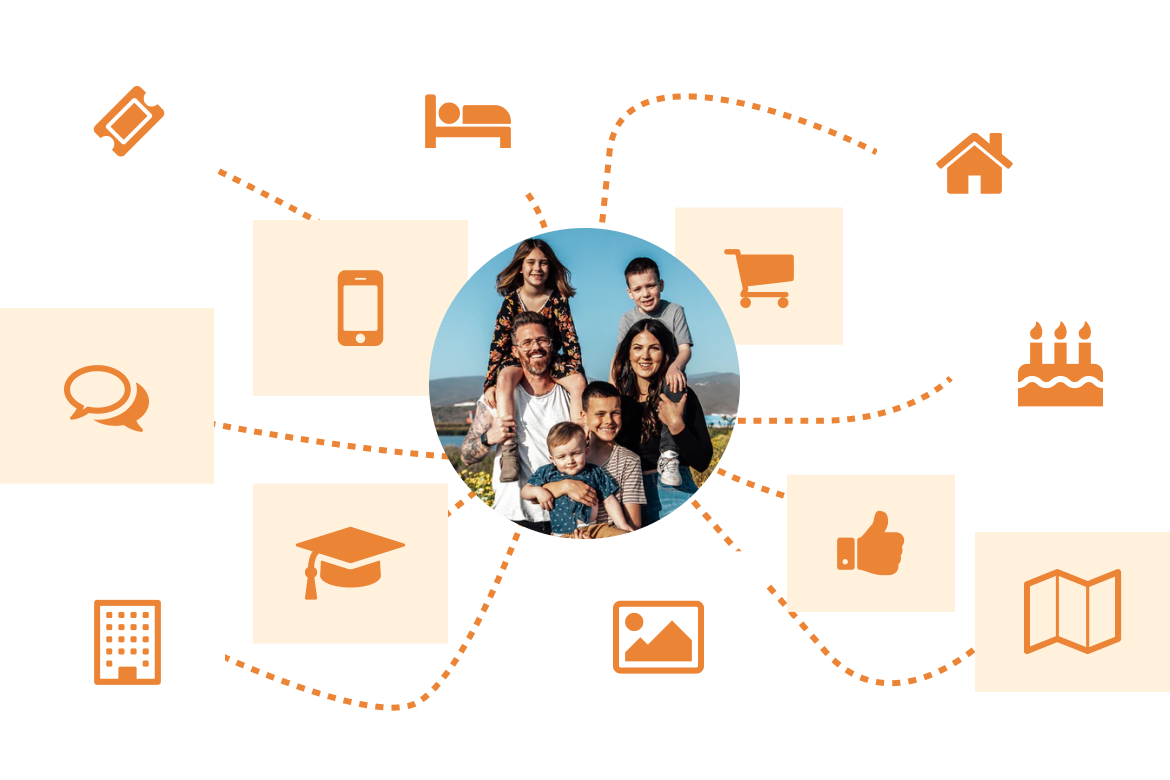
Your CRM should be able to integrate data from all parts of your PMS and other systems if needed.
The data a good hotel CRM will be able to integrate into a single guest profile include individual transactions, booking history, survey responses, marketing engagements, and more. All of these data works together to help your marketing and guest services teams paint a complete picture of each person who visits your property.
#2) A hotel CRM cleans your guest data.
Next up is cleaning that data. This cleansing functionality is a vital step that is often overlooked but something that is part of the best hotel CRM platforms. To use our previous example, Julie Jones may have made bookings with her personal email address, her work email address, from her more address, from a different home address once they moved, or perhaps her husband made a couple of those bookings when she wasn’t able to. Your hotel CRM software needs to be able to recognize that all of those transactions apply to Julie’s household. This is important for two reasons. First, you want to avoid creating duplicate records for Julie and her family to keep your database clean and organized. But, second, you also want to be able to see all of Julie’s history when you or an agent looks at her guest profile.
Likewise if there was a typo or other issue in the data, a hotel CRM should be able to use many datapoints to connect the dots between hotel guests and avoid creating duplicate records in your CRM. Data in the hospitality industry is very unique relative to other industries, so choosing a crm platform that is built for hoteliers is critical. If Julie accidentally booked as Julei Davis instead of Julie Davis, you don’t want a duplicate record to be created that doesn’t tie back to her guest profile in your hotel’s CRM.
#3) A hotel CRM organizes booking data into guest profiles.
Once the data is cleansed, the hotel CRM software will accurately organize these guest insights within that guest’s profile. And not just for the guest, but for the household to ensure that families who travel together aren’t treated as multiple different guests and their behavior is accurately categorized. This is also true across multiple systems. These guest profiles will be able to show what a guest booked in the property management system, what their survey results were after that stay, what emails they opened before they booked, what activities they purchased from your POS, and so forth. Again, you don’t want multiple records for the same guest, you want one complete guest profile and a hotel CRM can provide that.
Using our example, if Julie’s husband books their weekend trip for their anniversary, the systems needs to use things like physical address and last name to ensure that this booking is tied back to the household’s profile so, once again, you see the full history of Julie’s interactions with your hotel when you look at her profile in the CRM.
#4) A hotel CRM integrates guest profiles into touchpoints.
Now, having this information about your guest is one thing, but your team needs to have access to that data so that as they talk to these guests they can customize those messages and interactions to their specific behaviors, preferences, and trends. For example, a call center agent can use the hotel CRM to look up the guest they’re speaking with and see their full transaction history across all of your systems. Your marketing team can use the hospitality CRM to build a segment of guests who typically travel alone on midweeks with an average length-of-stay above 3 nights and use email marketing or SMS marketing to fill that soft midweeks you’re seeing in your occupancy pacing report. And the concierge should be able to see VIPs who are arriving today so they can find unique ways to serve and delight those guests. A sales manager on your hotel’s sales team can use guest data to identify future leads based on the behavior of previous guests. A hotel CRM gives each of these teams access to your guest profiles.

A good hotel CRM should be able to put guest profiles in all the places you need them.
This is also true on the aggregate. If Julie gets an email from your hotel, the data in the CRM should be dynamically customizing what she sees so the message and imagery are relevant to her. This is only possible if the guest data in your hotel’s CRM is able to sync to the channels you use to communication with your guests.
#5) A hotel CRM can automate messaging based on guest behavior.
Finally, your hotel’s CRM will allow you to automate alerts or messages based on guest behavior to identify issues that can be resolved or opportunities to provide guest service or generate revenue. These automation tools are especially powerful when paired with email marketing. For example, your CRM could set up a workflow to alert you if a VIP guest indicates they had a poor experience when filling out a post-stay survey so that your front desk, call center, or concierge can quickly intervene and remedy the situation before their loyalty is lost. Your marketing team could use the hotel CRM to automate an email to guests who only booked two nights of lodging encouraging them to stay an extra night. Or they could automatically trigger an pre-built email template shortly before the guest arrives helping them navigate transportation issues you often see showing up in low-NPS survey results or upselling them on experiences they haven’t purchased. Either way, automation has quickly become a key component of an effective hotel CRM that opens up incredible opportunities for revenue generation and guest service.
Using the example of Julie, this is where having all of her past data is so important. If you think Julie is a first-time guest and she has a bad experience, you may not realize the potential loyalty you are losing until it’s too late.
Why does your hotel need a CRM system?
As we just mentioned, a CRM solution that is built for the hotel industry gives you visibility into your guest behavior in ways that allows you to do many things much better than if you were flying blind. Primarily, however, there are three key reasons you need a hotel CRM.
- High performance marketing
- Accurate analysis of guest behavior
- Guest service
All of these will help your hotel business generate more revenue and guest satisfaction. Let’s talk through each one.
#1) A good CRM enables high-performance marketing.
When a CRM system makes it so everything you know about your guests can influence every marketing message you send them, your performance can go through the roof. When hotels have switch to Inntopia Marketing Cloud, for example, we’ve had many say that they’re sending fewer email marketing campaigns than before but seeing 2-3x the revenue generated from those emails because they’re able to perfectly target guests based on their behavior or customize the contents of the email dynamically based on each guest’s data which, in turn, increases the match between the message the guest receives and the likelihood they’ll act on it.

Automations use hotel CRM data to reach guests at ever stage of the travel cycle.
This is especially true when it comes to marketing automation. While building more targeted audiences on social media is absolutely enabled by your CRM, email automated based on guest behavior like check-ins or other points along the customer journey will generate incredible amounts of customer loyalty and revenue. The best part of automation is just what the name says: it’s automated. So if you identify an opportunity where a message could reach a really targeted, relevant type of behavior, you can set that up once and never have to touch it again.
#2) Your hotel’s CRM provides an insightful look at guest behavior.
Without guest data all in the same place, it’s incredibly hard to get an accurate, comprehensive view of your hotel’s performance and trends. A hotel CRM’s ability to bring all of that data together and organize it in an easy-to-access place gives your team the opportunity to go behind things like RevPAR and occupancy as performance metrics and truly understand who is coming to your hotel, how they’re interacting with your property, staff, loyalty program, or marketing, why they’re coming to your hotel, who is most likely to return, what common factors are behind your most valuable guests, and understand where to focus your efforts with marketing and guest service to increase loyalty and streamline the guest experience.
This is true on the aggregate, but it’s also true on a more focused level. Being able to drill in to trends and behaviors based on very specific groups of hotel guests – VIPs, first-timers, families, etc. – opens up incredible opportunities for enhancing the guest experience and delivering more targeted marketing, all thanks to your CRM.
#3) Your CRM should enable next-level service for hotel guests.
To that end, your hotel CRM software will also give you the insights you need to provide a level of customer support and guest service that’s simply not possible when your guest data is siloed and disorganized. Whether it’s recognizing a VIP at the front desk, tailoring a reservation to their specific needs in the call center, providing highly-relevant recommendations in pre-arrival and in-hotel messaging, or a dozen other opportunities, all of this is made possible by a CRM solution that connects everything you know about your guest to everyone at your hotel who is working to attract them to your property and help them have an incredible visit once they do.
This is where it’s critical your hotel’s CRM software is able to get this data into the hands of every member of every team. If your front desk or call center can’t access your CRM to see those guest profiles, they might as well not exist.
Hotel CRM Pricing
A quick note about pricing. It’s extremely tempting for budget-conscious hotels to simply go for the most affordable option. The dynamics of guest data, however, mean that the more you invest in unlocking the patterns and dynamics within this data, the greater the ROI you can generate. Marketing teams may compare pricing between two platforms, but the most important thing is to compare feature sets and the potential opportunities for increasing customer loyalty, improving the customer experience, and taking full advantage of your customer data in ways that align to your hotel’s specific needs.
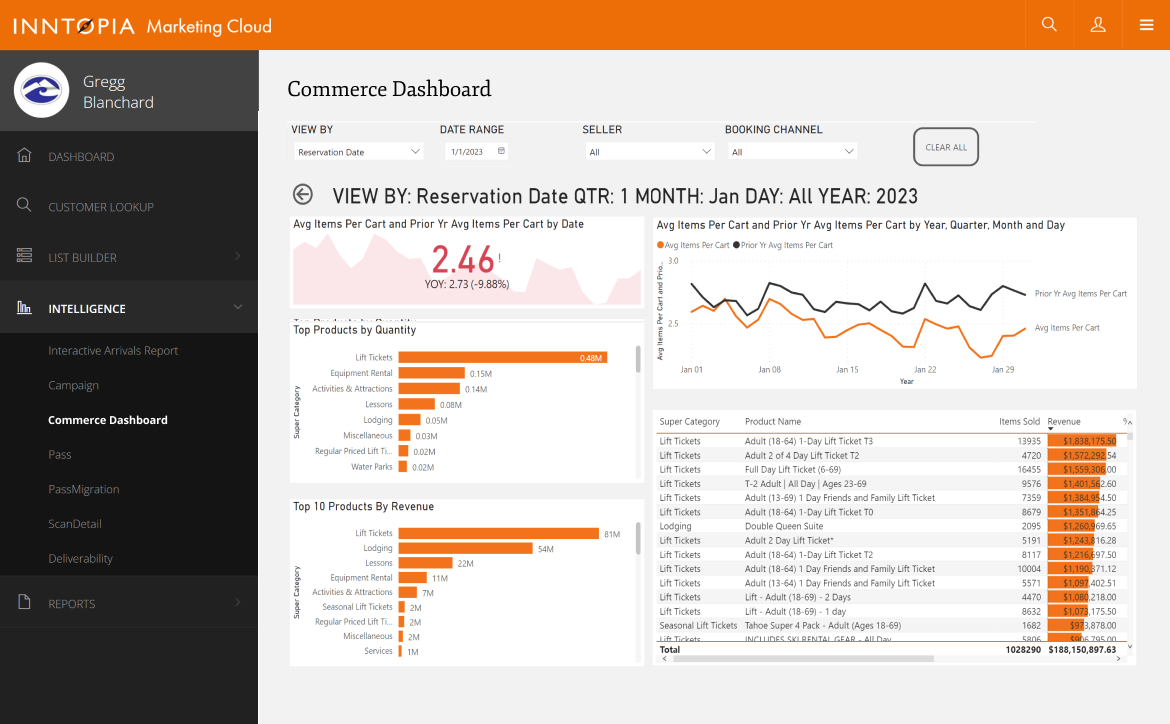
Guest profiles in your hotel CRM should show behavior across all profit centers.
Choosing the Best CRM for Your Hotel
Choosing the best CRM software is a decision that every hotel needs to put careful thought and time into. And the answer may be different for each hotel, even different hotels within a portfolio. Ask questions like:
- What do I wish I knew about my hotel guests?
- What guest behaviors can we not use when targeting emails or ads?
- Who on my team doesn’t have access to guest profiles?
- What reporting gaps do we have with our current performance metrics?
- What causes poor experiences at our hotel and what prevents us from helping guests avoid these issues?
But even if you ask the right question, there are common pitfalls when choosing a resort CRM. Here are three common ones we see.
#1) Choose a hotel CRM that isn’t flexible to hotel needs.
It’s easy to look at all hotels and think they’re roughly the same. But when you factor in the markets the serve, the level of service they provide, and the type of travelers they welcome, each is very unique. Choosing a hotel CRM that doesn’t let you customize the email templates you work with or the guest traits you want to group your customers into forces a unique brand into a one-size-fits-all box that isn’t worth the price, no matter how low.
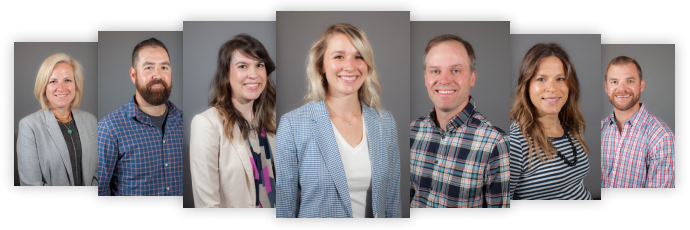
Our hotel CRM account managers average more than 10 years of experience.
#2) Choose a hotel CRM purely based on price.
Which brings us to the second mistake, choosing a hotel CRM purely on price. The difference between an average CRM and a great CRM may be a few hundred dollars a month in terms of price, but the difference in revenue generated (and, thus, ROI) between these systems can sometimes be 10x to 15x. A great CRM allows you to take advantage of the unique opportunities found within your guest data, not the generic opportunities that exist across an average hotel.
#3) Not taking into account the quality of CRM support.
A CRM that can deliver business-changing ROI is not a toaster or a microwave. It’s not something you can buy one day and have a huge return on the next. It’s partly why CRMs have an odd perception in the hotel industry, simply because most CRMs try to be plug-and-play and, in return, deliver average results. A great hotel CRM will be a platform that you can build incredibly powerful marketing, guest service, and analysis on top of. Which means that you need a team you can lean on to take your vision and make it a reality. You’re the expert at your hotel’s business, they’re the experts at hotel CRM, and together you can do amazing things.
Hotel CRM software like Inntopia Marketing Cloud can help you solve these problems and more. So sit down with your team, identify the problems you need to solve, and take some time to shop around and find the perfect CRM for your property.
Have a question? Just ask.

Tyler Maynard
SVP of Business Development
Ski / Golf / Destination Research
Schedule a Call with Tyler→

Doug Kellogg
Director of Business Development
Hospitality / Attractions
Schedule a Call with Doug→
If you're a current Inntopia customer, contact support directly for the quickest response →
Request Demo
A member of our team will get back to you ASAP to schedule a convenient time.


